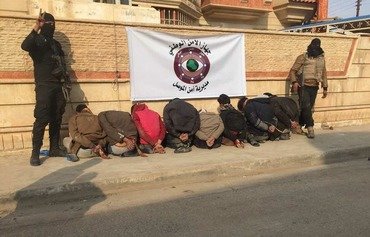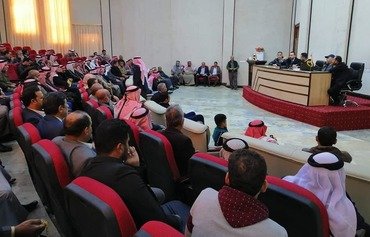Baghdad's local government on Tuesday (June 7th) announced it was restoring the mukhtar system in the capital to support security efforts against the "Islamic State of Iraq and the Levant" (ISIL).
The mukhtars, who head a village or neighbourhood, will be responsible for assisting security agencies in monitoring suspicious activity or people in their areas, Iraqi officials said.
"The mukhtar system is a traditional local security system," said Baghdad deputy governor Jassem Boukhaty. "A mukhtar, as it is known, is a dignitary who knows the residents of the neighbourhood and all the residents know him."
"Given the effective role these dignitaries could play, we decided to use them again," he told Mawtani.
A mukhtar, by virtue of his extensive relations with residents, can monitor all strangers coming to his area and can check their details and places of residence, he said, as well as monitoring any suspicious activities.
"Investigations have shown that many of the bombings that hit the capital, most recently in Baghdad's Jadida district and Sadr City, were executed by people from outside these areas who had rented homes and apartments there to plan and manage their terrorist attacks," he said.
Mukhtars will be able to track illegal residential occupancies, he added, by getting to know new residents, finding out where they came from, and providing security forces with information.
To date, Boukhaty said, Baghdad's government has commissioned 400 dignitaries in residential areas to serve as mukhtars, selecting them on the basis of their competence, integrity and good reputation.
This is a pilot phase, he said, noting that more mukhtars will be needed as Baghdad comprises 37 administrative units divided into small towns or neighbourhoods that house about eight million people.
Additional security measures
Restoring the mukhtar system is part of other projects to promote security and stability in the capital, Boukhaty said.
The local government is in the process of installing 23,000 new surveillance cameras in the streets and neighbourhoods of the capital and issuing the unified electronic national identity card, he said.
Another project, "Saqr Baghdad", aims to register all vehicles in a security database, he added.
Heads of neighbourhoods act as a link between residents and the security services, and as an intelligence source that can monitor suspicious activities and provide important information, said Saad al-Matlabi of the Baghdad provincial council's security committee.
Restoring the mukhtar system "has been one of our council's demands for quite some time due to its importance", he told Mawtani, adding that "it will reflect positively on the overall security situation in Baghdad".
Matlabi also stressed the importance of implementing the "Baghdad Fence".
This project aims to set up "eight main entrances around the capital, equipped with cameras and devices to detect explosives, as well as the deployment of concrete barriers equipped with sensors and monitoring equipment", he said.
"Baghdad is surrounded by seven districts, all of which are agricultural areas," he added, noting that these provide "a safe haven for terrorist elements".
"The 300-kilometre fence project will secure the borders of the capital from all sides and prevent terrorists from threatening people's lives and their property," he added.
Security adviser Fadel Abu Ragheef described the mukhtar system as "a step in the right direction".
Mukhtars are a crucial part of the security system, he said, as they are able to provide the security agencies with pertinent information about newcomers.
"These measures will help the security forces discover the nests of insurgents, particularly those who are trying to infiltrate with displaced families and implement their terrorist operations out of residential neighbourhoods," he said.

![A member of the Iraqi security forces monitors a checkpoint in Baghdad. [Photo courtesy of the Baghdad Operations Command]](/cnmi_di/images/2016/06/10/5551-Iraq-security-checkpoint-600_384.jpg)







Trying to be like Kurdistan.
Reply1 Comment(s)